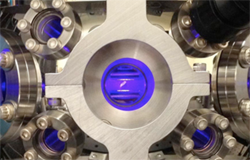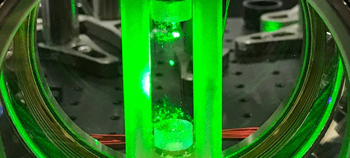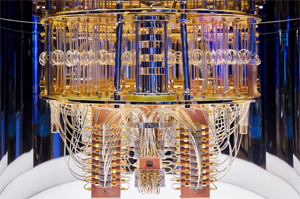Program Overview
Quantum Information Science (QIS) is a burgeoning field at the cutting edge of education, research, and technology. It brings together scientists and engineers that have traditionally worked in separate disciplines including physics, materials science, electrical engineering, computer science, chemistry, mathematics, and statistics.
Recent experimental and theoretical advances in materials, design, fabrication, and control of a range of quantum-mechanical systems have fueled tremendous strides in the field. As a result, QIS now accounts for a substantial fraction of physics research as a whole. Cross-disciplinary aspects and strong links to industry, furthermore, speak to the significant potential impact of QIS on both science and society.

Hudson research group.
The UCLA Master of Quantum Science and Technology (MQST) program prepares students for research and development in quantum technology. Students in the MQST program will learn and strengthen their knowledge of the foundations of quantum mechanics, quantum computing, quantum information, and quantum devices.
They will learn how to work in the laboratory with quantum optics, quantum sensing and materials, and quantum devices, and they will learn the algorithms, languages, and tools of quantum computing. A distinguishing feature of the UCLA MQST program is the year-long laboratory sequence in which students gain hands-on experience in quantum research and experimentation.

dark matter -
Hamilton research group.
The program upholds UCLA’s high academic standards, has the support of industrial partners, and gives students the opportunity to interact with faculty experts and to gain hands-on experience in world-leading research and development.
Courses
The UCLA Master of Quantum Science and Technology is a one-year, full-time program that begins in Fall and concludes at the end of the following Summer quarter. The program consists of nine courses (36 units), an internship, and a capstone presentation on the internship. The core courses are designed specifically for the MQST program. The MQST curriculum emphasizes breadth and laboratory work and will equip students to apply their skills in diverse settings.
Typical Program Curriculum
Fall Quarter
- Phys 245: Quantum Computation (4 units)
- CS 238: Quantum Programming (4 units)
- QNT SCI 411: Ensemble Quantum Computing Lab (4 units)*
Winter Quarter
- QNT SCI 402: Quantum Information (4 units)
- CS 238B: Quantum Algorithms (4 units)
- QNT SCI 410: Quantum Optics Lab (4 units)*
Spring Quarter
- QNT SCI 403: Theory of Quantum Devices (4 units)
- Elective (4 units)
- QNT SCI 412: Solid State Quantum Computing Lab (4 units)*
Summer Quarter
- QNT SCI 597: Capstone Project (4 units)

two-qubit SWAP gates - Chee Wei Wong research group.
*The Lab Modules do not need to be taken in order and may be taught simultaneously. Each Lab Module requires the students to complete approximately five laboratory experiments per quarter. The topics of the experiments are within Quantum Optics, Quantum Sensing and Materials, and Quantum Devices.
Current approved electives for 2024-2025:
- BIOMATH 204
- CHEM C115AB, C215AB, 219S, 219V
- COM SCI 132, M146, 161, 259, 260B, 260C, 263, 267A
- EC ENGR 100, 101B, 110, 110H, 110L, 111L, 113, 115ABC, 115AL, 121B, M146, M153, 163A, 163C, 163DA, 170A, 170B, 170C, 231E, 232E, C243A, 252
- MATH 120AB, 156, 167, 210C, 226A
- PHYSICS 115C, 118, 123, 140AB, 170A, 170N, 192, 213ABC, 215A, 221ABC, 231B, 241ABC
- STATS 202C
The above elective list is not exhaustive. As such, if a student finds an alternative course better suited to their interests, they may choose to enroll in that course. Students must first consult with the Program Director for approval of the alternative course to satisfy the elective requirement.

(by IBM Research)
Capstone Project
QNT SCI 597 will occur during Summer Sessions and consist of a research experience lasting at least 9 weeks. Students will either perform research in the group of a UCLA professor (for example, the faculty members of the UCLA Center for Quantum Science and Engineering) or through an approved internship at a QST-related company. Near the end of Summer session, the students will submit a comprehensive Capstone report, to be graded by their committee, and present their work in our Capstone projects day.
